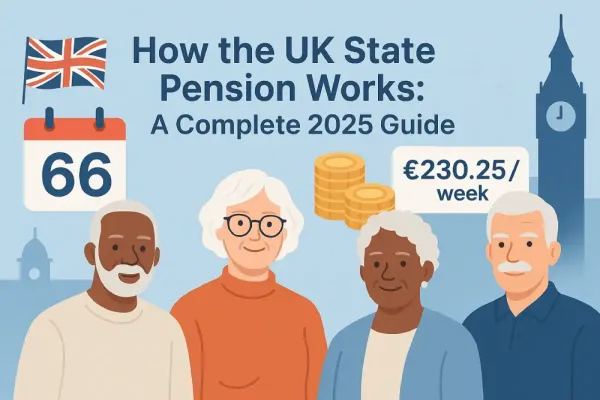Understanding the State Pension in 2025: Eligibility, Payments & More

The UK State Pension is a cornerstone of retirement income for millions of people. This 2025 guide covers eligibility, how your pension is calculated, payment schedules, factors that can impact your State Pension, and how to integrate private or workplace pensions into your retirement plan.
Eligibility Requirements
State Pension Age
- State Pension age in 2025 is 66 for both men and women.
- It will increase to 67 between 2026 and 2028.
- Use the State Pension Calculator to check your exact age and eligibility.
National Insurance Contributions
- You need at least 10 qualifying years on your National Insurance (NI) record to receive any State Pension.
- A full new State Pension requires 35 qualifying years.
- NI years can be earned through employment, self-employment, or qualifying credits (e.g., caring or unemployment benefits).
Pension Eligibility for Expats
- British citizens living abroad may still claim State Pension if they’ve paid enough NI contributions.
- The UK has agreements with many countries to allow payments to continue and increase.
- In countries without agreements, your pension may be frozen at the rate when you left the UK.
Pension Amount Calculation
Full New State Pension
- 2025/26 full new State Pension: £230.25 per week or £11,973 per year.
- You receive the full amount with 35 qualifying years.
- Having fewer years results in reduced payments (at least 10 years are needed to qualify).
Basic State Pension
- Applies to those who reached State Pension age before 6 April 2016.
- Basic State Pension (2025/26): £176.45 per week or £9,175 per year.
- Requires 30 qualifying years.
Pension Forecasting Tools
- Check your estimated pension using the State Pension Calculator.
- Use the National Insurance Tool to find and fix any NI gaps.
- Useful for preparing your retirement income and spotting opportunities to increase your pension.
Payment Structure
Weekly and Monthly Payment Schedules
- Paid every 4 weeks, straight into your bank account.
- The exact weekday depends on the last 2 digits of your NI number:
- 00 to 19: Monday
- 20 to 39: Tuesday
- 40 to 59: Wednesday
- 60 to 79: Thursday
- 80 to 99: Friday
Pension Deferral
- You can defer your pension to receive higher payments later.
- The increase is about 1% every 9 weeks of delay (~5.8% for a full year).
- Deferring can be useful if you’re working beyond State Pension age.
Claiming Your Pension
- You won’t receive your State Pension automatically — you must apply.
- You can claim:
- Online
- By phone
- By post
- Apply up to 4 months before reaching State Pension age.
Factors Affecting Your Pension
Gaps in National Insurance Record
- Missing qualifying years can reduce your pension.
- You can fill gaps by making voluntary NI contributions (Class 3).
- The cost is about £800 per year missing, which adds around £5.82/week to your pension.
Inflation and Triple Lock System
- The State Pension is protected by the Triple Lock:
- Highest of CPI inflation, average wage growth, or 2.5%.
- For the 2025/26 year, pensions increased by 4.1% (wage growth figure).
Voluntary Contributions
- You can pay for the past 6 tax years to fill gaps.
- Particularly helpful for those who took time off for childcare, travel, or lived abroad.
Private and Workplace Pensions
Difference Between State and Private Pensions
- The State Pension is guaranteed by the government and based on NI.
- Private/Workplace pensions are savings built from contributions by you (and your employer), usually invested.
💡 For a more accurate plan, check your full pension forecast with our UK Pension Calculator.
Auto-Enrolment Explained
- All employers must enroll eligible employees into a pension scheme.
- Minimum contribution:
- 8% of earnings (5% from employee, 3% from employer).
- Trigger in 2025/26:
- £10,000/year income.
- Earnings band for contribution: £6,240–£50,270.
Pension Transfers and Consolidation
- Helpful to combine pensions from previous jobs to simplify management and reduce fees.
- Check terms and potential exit fees or loss of benefits before transferring.
Retirement Planning
Early Retirement Considerations
- You cannot access the State Pension early.
- You can access private/workplace pensions from age 55 (increasing to 57 from 2028).
- Taking pensions early usually reduces your annual income.
Retirement Budgeting
- Assess all income sources:
- State Pension, Workplace Pension, Private Pension, Savings.
- Use tools like the Retirement Budget Calculator to plan monthly expenses and withdrawals.
Financial Advice and Tools
- Seek regulated financial advice, especially for transfers, annuities, or flexible drawdown options.
- Use online tools and forecast calculators on UKPensionCalculator.com to test scenarios.
FAQ
When can I claim my State Pension?
A: When you reach State Pension age (currently 66 for both men and women).
How do I know how much State Pension I’ll get?
A: Use the State Pension Forecast Tool to check your estimate.
Q: Can I increase my State Pension?
A: Yes! Through voluntary contributions or delaying your claim (deferring).
Q: Will I get my pension if I move or live abroad?
A: It depends on where you move. With some countries, your pension will increase annually; with others, it may be frozen.
Get Started: Plan Better for Retirement
For accurate pension estimates and personalized planning, explore:
Explore more tools and advice at ukpensioncalculator.com to take control of your retirement future.
Posted 2 weeks ago by Jason